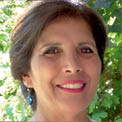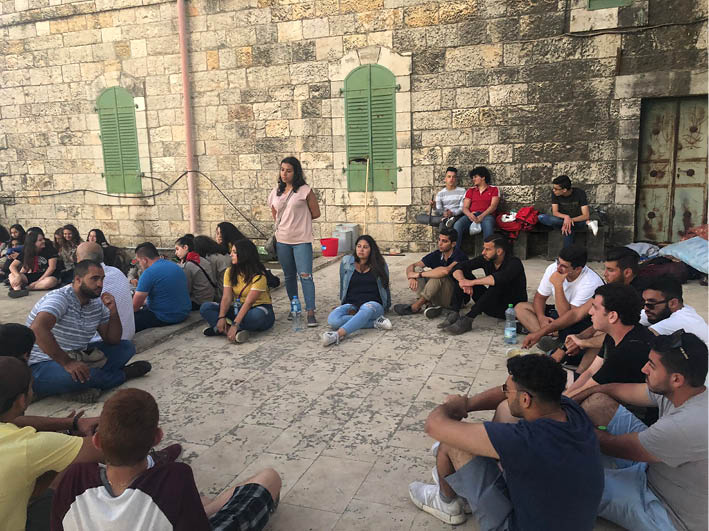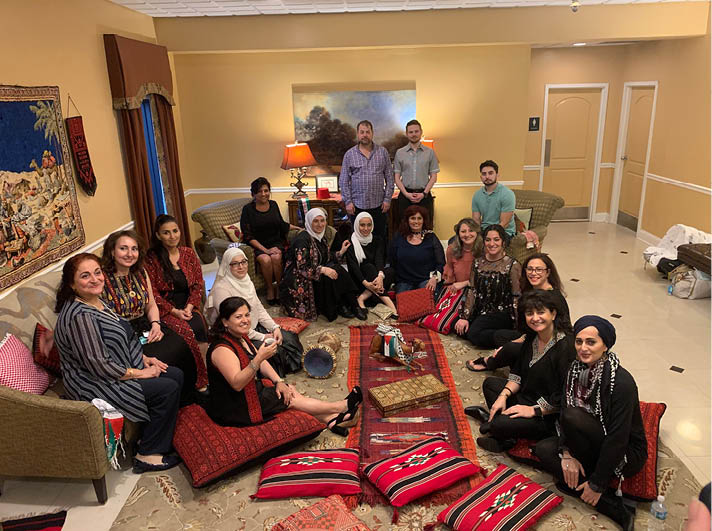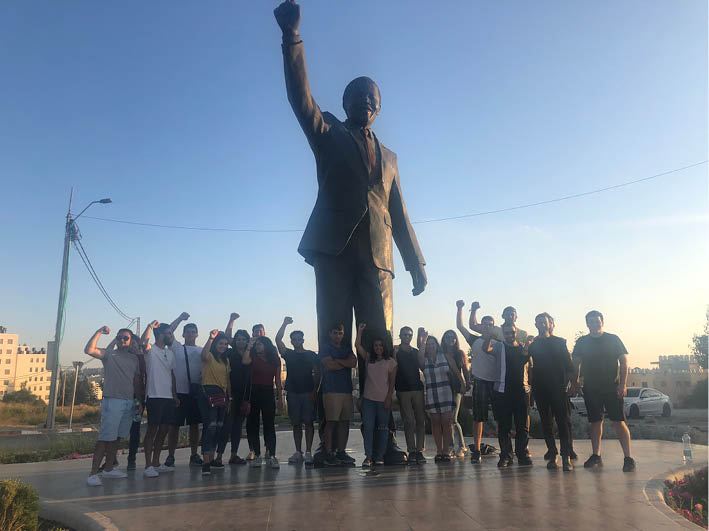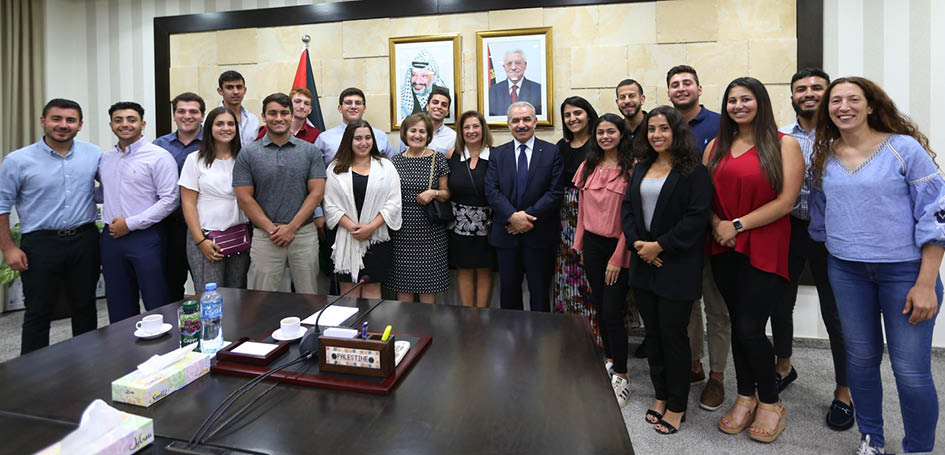Palestinians in the diaspora have a “Palestinian radar.” We can spot a Palestinian in a room full of strangers and will gravitate to him or her. “Ana Dammi Filistini” (my blood is Palestinian) are not merely words from a beautiful song; they are the mantra of our lives. In the United States, people who come from Palestine or have a Palestinian lineage enjoy a unique sense of kinship, a relationship to both each other and their homeland. We are proud of our culture and heritage and consider ourselves part of the struggle. Our identity is printed in our hearts and demeanors. Regardless of whether we are immigrants, first-, third-, or fifth-generation descendants of Palestinians, we feel honored to be Palestinian Americans.
Whether we live in Detroit or Alabama, are Muslims or Christians, or come from Ramallah, Jerusalem, Nazareth, Al-Bireh, Beit Hanina, Birzeit, Jifna, or Deir Dibawan, we manage to build a mosque, church, social club, or cultural center to tie people together. One of the most successful organizations with the mission to connect people and promote the Palestinian way of life is the American Federation of Ramallah, Palestine (AFRP). Established sixty-four years ago by young university students who wanted to maintain their identity and connect with others throughout the country, the federation started with a small gathering and has grown to 40,000 members who live throughout the United States. Today, the AFRP has 33 branches in 33 states and publishes a bi-monthly magazine that provides its members with information about the community from the womb to the tomb.
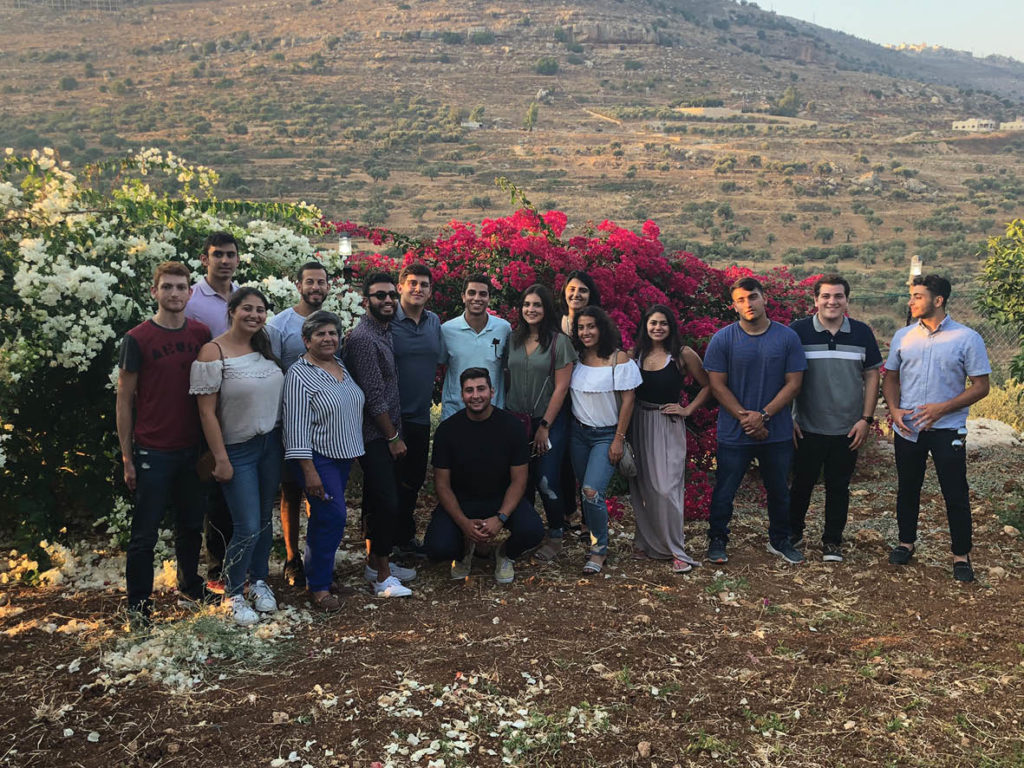
The Ramallah family and their descendants in the diaspora are well versed in their history and conscious of the richness of their culture. They have made great strides and thrive in their new country, yet their souls lean toward Palestine. To keep lit the flame of their love for their country of origin, they have developed ways to keep the community together and support Palestine as much as they can. With the help of its members, the AFRP has developed numerous programs in which the communities in the United States and in Palestine can engage, all of them geared toward building connections between Palestinians who reside in the US and their brothers and sisters in Palestine. These successful programs include scholarships for needy students in the US and Palestine (60 scholarships annually); annual medical missions in which health care professionals travel to Palestine to provide medical care, hold training sessions, and deliver needed equipment to health care facilities; as well as educational and cultural exchange missions, established in an effort to connect influential leaders in the US with the Palestinian people. Project Hope, a program geared towards college students, aims to link young adults with Palestine and the City of Ramallah and to awaken and cultivate the spirit of volunteerism in the community. Students aged 13 to 17 years from across the US gather in Camp Ramallah to experience Ramallah’s legacy and learn about Palestinian history and culture while enjoying adventurous outdoor experiences.
One of the most significant and enduring AFRP activities is the annual convention, held in major cities in the United States and in Palestine. This event brings together about 3000 members each year to celebrate, reenergize, and educate; it connects members with each other and engages them in issues that affect them. Long before the rise of social media, the AFRP convention was an eminent venue where many Palestinians found – and still find – their soulmates; numerous nuptials have occurred as a result of these conventions. But besides fostering social relations, these conventions serve as incubators for innovative ideas and programs such as the Memory Project in which the AFRP chronicles the stories of its members, archiving them for the future. These are but a sample of programs organized by the AFRP.
The AFRP is possibly the largest Palestinian organization that keeps the Palestinian people linked to their motherland, but it is by far not the only one. Communities such as Deir Dibwan, Al-Bireh, Birzeit, and others have built similar infrastructures to ensure that the people from their communities are aware of their family tree, ingraining in their members the importance of their Palestinian identity. Besides village-based organizations, Palestinian communities in the US have built many non-profit and civic organizations that aim to help keep Palestinian heritage, customs, and concerns at the forefront of their members’ minds and to raise awareness of Palestinian issues among their contemporaries. Organizations such as the United Palestinian Appeal (UPA) are committed to alleviating the suffering of Palestinians in the West Bank, Gaza Strip, and refugee camps in Lebanon and Jordan. The UPA concentrates its engagement on supporting the long-term socio-economic and cultural development of Palestinian society. Likewise, the Palestinian American Community Center (PACC) in New Jersey’s sole mission is to sustain and strengthen ties to Palestinian traditions while empowering the entire community to safeguard its success and well-being. Like the AFRP, the PACC brings families together to keep them rooted in their ethnicity.
These are but some samples of organizations active in the United States. While these organizations play a pivotal role in connecting Palestinians with their homeland, they pale to the work that is being done by our younger generations, whose voices are being heard throughout the country. Generation X and millennials bring hope to their predecessors who set forth the foundations of the Palestinian heritage but have failed to execute their plans strategically due to fear of negative repercussions. These upcoming Palestinian-Americans possess more courage, drive, and intellect than their predecessors. Almost at every major university in the United States, one can find the footprint of work being done by Palestinian students. Despite many obstacles and a prevailing lack of adequate funding, our university students ensure that the voices of the Palestinian people are being heard. They build coalitions with members of other cultural, human rights, and civic institutions and participate in civic activities. They recruit and engage people from various backgrounds in speaking out for the Palestinian cause. For the first time in history, a number of university student councils have supported the Palestinian cause in the face of mounting powerful and well-financed opposition.
Activism and support for the Palestinian struggle and culture do not stop at university doors, Millennials and Generation X speak proudly of their heritage – even if it costs them friends and funds. Super models such as Gigi and Bella Hadid are part of the movement of young people who stand tall to proclaim their pride in their Palestinian ancestry. Comedians such as Mo Amer, Amer Zahr, and Maysoon Zayed use comedy to promote an accurate narrative of the Palestinian people and history.
David Ben-Gurion once said of Palestinians, “The old will die, and the young will forget.” He obviously was wrong because regardless of where we live, we are proud and rooted Palestinians who will never forget. We are bound by our love for the homeland.
Even though the American government’s opposition to the Palestinian people and their aspirations seems unsurmountable, especially in the halls of Congress, we can be inspired by congressmembers Justin Amash (Ramleh) and Rashida Talib (Beit Ur Al-Fouka) and their unwavering support of the Palestinian people. Despite threats, they steadfastly speak on behalf of the Palestinian people; they oppose the unequivocal support to the State of Israel and are not afraid to talk about Israel’s oppression of the Palestinian people. Both congresspeople have become an example that many wish to emulate. Inspired by their courage, many young Palestinian Americans throughout the United States are now venturing into politics and participate in local, state, and the federal government. A few are running for elective offices.
This was not the case in earlier years, when our elders, fearing for our safety and hoping to shield us from harm, encouraged us to stay away from politics. While they imbued us with Palestinian culture, they warned us to be careful when being vocal. Many instructed us to say that we are Syrian or Greek for fear that someone might harm us. One can count on one hand the number of people who in the 1980s and early 1990s worked in government and were not afraid to speak out. Very few people actively and publicly voiced their concern over the atrocities committed by Israel against the Palestinian people. We admired professors Edward Said, Rashid Khalidi, and Ibrahim Abu-Lughod but did not know how to communicate our position to mainstream society ourselves. Our voices during that era addressed mainly the Palestinian and Arab communities. Working for the regional government in Michigan and active in the Democratic Party, I frequently found myself alone when speaking out on behalf of the Palestinian community. Even though I became the first assistant county executive in my regional government and was a delegate for president Clinton at the Democratic convention, many in my community warned me of speaking out. They feared for both my safety and my career. There were some elements of truth in their fear, but, luckily for all of us, we have transcended this fear and are now moving forward on all fronts.
Our ancestors gave us roots and wings, and we soar with pride, holding on to our Palestinian identity.
Today, the Palestinian community is engaged in all aspects of society. Instead of keeping the beauty of Palestine to ourselves, we now show the world our history and civilization without feeling abashed. For example, the first Palestinian museum opened in Washington DC in 2019. Its visitors come to learn about the Palestinian narrative and its stories. Exhibits portray the reality of Palestine and dispel the prevailing inaccuracies and stereotypes. Yet while they address the atrocities, they concentrate on history, culture, and civilizations.
On a personal level, the Palestinian people in the United States have achieved the American dream. They are considered among the most successful immigrants in the country. The strides the Palestinian community has made on all fronts is impressive and amazing. An internal survey of our community found that the Ramallah community in the diaspora is 25 percent more educated than average Americans. Our college and post-college graduation rates are second only to Asian Americans. You can find Palestinian Americans leading in every corporation, in hospitals, and in various non-profit organizations. We excel as physicians, lawyers, and engineers. We are the entrepreneurs who are making America great, the educators who are molding the future of America and Palestine, and the journalists who bring accuracy to the news. We are the inventors who advance technology and the philanthropists who help civil and human society, both in the US and in Palestine.
That is not to say that our community does not face problems. Like all societies, we have the good, the bad, and the ugly. Some of us still hold on to traditions that long have become outdated. These people impose restrictions on their children, especially their daughters, that drive them away from their heritage. Some still believe that we can circumvent the system and succeed with our aspirations. Indeed, with education and the flow of global information, things are changing for the better. Collectively, our ancestors can be proud of our accomplishments.

